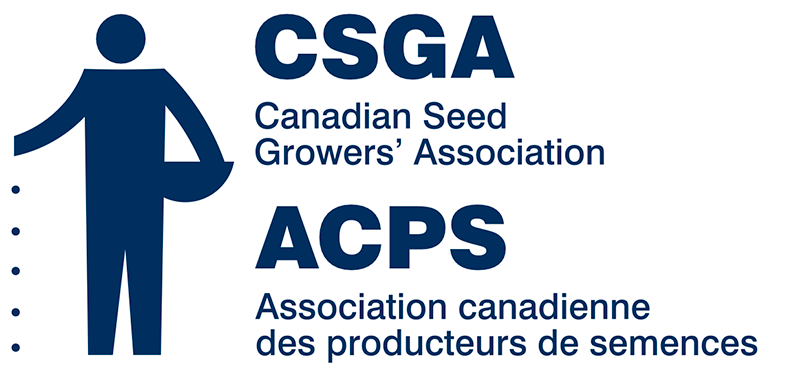Notice of Special General Meeting
The six-week consultation period on proposed fees and an inflation fee adjustment policy closed on October 31, 2021. Thank you to those who participated and took the time to submit comments.
The CSGA Board of Directors has carefully reviewed all comments received and has revised the proposed fees, notably the acreage fees for grasses and forage legumes, hemp and soybeans, and hybrid canola. Also, the Board has decided to not include an inflation fee adjustment policy in its revised proposal. For a PDF the revised proposed fees, click here.
CSGA collects fees to deliver on its regulatory mandate to provide a national program for seed crop certification. To ensure CSGA is a strong, viable organization, financial security is critical. Under SRM and CSGA 2.0, CSGA has a strong vision for the future; where CSGA steps up and continues to play a leadership role in Canada’s seed regulatory system.
In most organizations, the Board of Directors sets the fees. At CSGA, the members approve fees that are prescribed by the Board. In 2019, CSGA members approved transitional fees to support the organization’s modernization activities and participation in the Seed Synergy Collaboration Project. Those transitional fees end this year. Without new fees approved by the members, CSGA will revert to the 2019 Fee Schedule, originally approved in 2016. The revenue generated from those fees is simply insufficient to support CSGA operations.
While we recognize that this year is difficult for many due to the drought and rising cost of inputs, the Board of Directors must fulfill its fiduciary responsibility. The Board carefully evaluated the proposed fees, reviewed the feedback received, analyzed the cost to certify different crop kinds, and weighed the ability to pay. After deliberation, the Board decided to present revised fees to members for approval at the November 24th Special General Meeting.
Results of the Consultation on Fee Review
Thank you to those who participated in the fee review consultation. Here are some common questions and comments received and our responses.
Q1. 2021 was a hard year on growers. Why is a fee review needed this year?
A1. For the past two years, CSGA has been operating with a transitional fee structure approved by the membership in 2019. Those transitional fees cannot be carried forward to 2022. Without a new fee schedule approved by the members, CSGA will revert to the 2019 Fee Schedule which was originally approved in 2016.
The 2019 Fee Schedule is insufficient to run the organization, which is why the new proposed fees are presented for approval. CSGA By-laws require CSGA members to approve the fees proposed by the Board of Directors.
Q2. Why are acreage assessment fees different for different crop kinds? Isn’t CSGA’s cost to certify a seed crop the same across all crop kinds?
A2. CSGA’s acreage fees are based on a tiered model, where different crops pay different acreage fees. The tiered model is based on the costs required to certify that crop kind, the necessary infrastructure, and to a lesser extent, the ability to pay.
The costs to certify a crop go beyond issuing a crop certificate. They include certification applications, crop inspection reports and form appraisals, in-season corrective actions follow-ups, client services, system infrastructure, standards development and international coordination, among many others.
While some crops (like wheat) require only one inspection, other crop kinds (like hybrid corn) require several inspections and supporting inspection documents requiring more time to complete their certification.
Certain crop kinds also require specific infrastructures. For example, hybrid corn has its own application process, corrective action system, and crop inspection report customized for its specific needs. Hybrid canola has a contra season framework, additional certification forms, and a unique data application program interface (API) with inspection services.
There are costs to develop standards for new crop kinds and to maintain standards and review them periodically to ensure they meet sector needs. But costs also go beyond the development of a standard. CSGA needs to work closely with CFIA to ensure the standards are properly supported from an inspection perspective (e.g., development of crop inspection procedures), and we also work to ensure that the standards meet the minimum requirements of the OECD and AOSCA to facilitate international trade. Further, CSGA continues to respond to the sector’s needs and develops new standards (for example, feminized hemp, hybrid wheat, hybrid mustard and quinoa standards that were developed recently).
To a lesser extent, as a regulatory authority, CSGA also factors in the ability to pay. This concept is based on the CFIA’s guiding principles for a cost recovery framework. Certain crop kinds do have a greater ability to pay based on the high-value nature of the crop kind and lack of common seed competition (for example, most hybrid crops).
Q3. Is CSGA a service agent of the Government of Canada? If yes, does that impact its ability to set its fees?
A3. CSGA is not a service agent of the Government of Canada and is not subject to the Service Fees Act.
An agent operating on behalf of the Government of Canada is performing activities or providing services that in different circumstances would be conducted or provided directly by government. For example, in the Canadian seed certification system, licensed seed crop inspectors may be considered delivery agents for the Government of Canada as they now provide a service that was once the exclusive domain of the CFIA. Seeds Canada (formerly the Canadian Seed Institute) administers a regulatory oversight program for registered seed establishments and accredited labs under an agreement with the CFIA and can be considered a delivery agent of the CFIA. It is directly responsible to the CFIA and operates under the supervision of the CFIA.
However, CSGA is mandated through the Seeds Act and Seeds Regulations by the Government of Canada to provide a national program of seed crop certification. The government itself has never provided such a program, and CSGA is not acting on behalf of the government. Instead, the CSGA is operating in partnership with government as a fully independent entity. CSGA’s primary source of revenue is fee-for-service. Historically the government of Canada did provide funding to CSGA for the administration of its national program of seed crop certification; however, this has not been the case for the last fifty years.
Q4. What do my CSGA fees go towards?
A4. CSGA service fees allow CSGA to fulfill its regulatory mandate and administer Canada’s national seed crop certification program. Budgets are presented to the CSGA Board of Directors for review and approval, and an Audit Committee is in place to review the organization’s finances. The Association is also audited every year by KPMG. A detailed breakdown of past CSGA activities and financials is available in the Annual Report section of our website. Specifically, fees contribute to the following:
-
- Certification activities and service delivery (e.g., issuance of crop certificates)
- Standards development and standards modernization
- Modernization initiatives (e.g., digital single window)
- Governance of the Association
- International harmonization (AOSCA & OECD)
- Organizational overhead (e.g., office lease, record retention, legal)
Q5. What is CSGA doing to lower expenses?
A5. As a non-profit organization, CSGA is always mindful of its expenditures, and we are always actively looking for ways to work more effectively. Recent examples include:
-
- CSGA moved to a new office location that reduced our leasing expenses. Our staff are now working in a hybrid work environment which reduced our need for a larger office.
- CSGA is actively looking for grants and other financing opportunities. In 2021, we secured $200,000 in external government funding.
- The shift to digital crop certificates has allowed CSGA to reduce postage costs and terminate the leasing of postage office equipment.
- We are completing an organizational effectiveness assessment to ensure our team is aligned with our organizational priorities and objectives.
- While we value in-person meetings, and some in-person meetings will still be required, we are committed to hosting our Executive, Board and Committee meetings virtually. Business can be conducted virtually from anywhere. Virtual meetings save time for our Directors, allow them to spend more time in their farm operations, and reduce travel expenditures.
Q6. With more digitization of your systems, shouldn’t fees be decreasing?
A6. CSGA continues to leverage its digital platform and business process automation to do more with less. CSGA runs one of the largest seed crop certification systems globally with 12 full-time staff and a digital-first mindset. In peak season, approximately 2,000+ automated workflows are running to help CSGA do more with less. The Association aims to continue automation and look for efficiencies in its business processes. However, as much as automation has improved our processes, not all aspects of certification can be automated. Staff are needed to answer calls, appraise reports, provide services, and audit all automated processes.
Q7. If CSGA is actively looking at reducing expenses, why are fees going up?
A7. CSGA is committed to sustainable budgets and operational efficiency. Although CSGA is actively reducing expenses, a fee increase is still necessary. The realized cost savings do not cover CSGA’s increased expenses. Increased fees are required to reflect:
-
- Increased costs of doing business. Nothing costs the same as it did in 2016. From office supplies, internet and phone services, and increased insurance premiums, the environment in which CSGA operates is changing. Like any other business, the cost to conduct business increases every year.
- Strong governance is critical, and CSGA Directors invest a lot of time in this area. To attract and retain strong leadership, Board Directors must be compensated for their time. Our Directors are all farm business operators, and their time in CSGA is time away from their private businesses. Members approved an increase to Director compensation back in 2017.
- CSGA invested substantial resources into the Seed Synergy Collaboration Project and pulled from its reserves to finance a portion of the efforts. We need to rebuild the reserves of this non-profit organization.
- CSGA’s new Business Plan and Seed Regulatory Modernization (SRM) policy positions focus on CSGA stepping up and taking on a greater leadership role in seed certification. To ensure positive outcomes, CSGA needs to make strategic investments to make that happen.
Q8. The fee proposal for approval by members has lower acreage fees than the fee proposal presented for consultation. Do the revised fees meet CSGA’s needs?
A8. The revised fee proposal presented to the membership for approval bring in approximately $70,000 less in revenue for the organization compared to the fee proposal released for consultation. If approved, the new fees cover our operational requirements but forces CSGA to be less ambitious in certain areas.
Q9. How are CSGA fees approved, and when will I be informed of the final decision?
A9. The Board of Directors is responsible for prescribing the fees for CSGA, but By-laws require members’ approval of the fees. Members are asked to attend and vote on the proposed fees in the upcoming November 24 Special General Meeting, from 12:30 pm to 1:30 pm EST. Please register for the meeting. Members are at the heart of CSGA, and your active participation in the Association is important.







